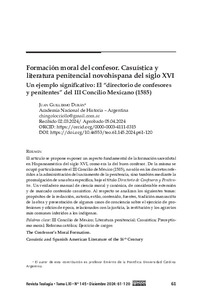Please use this identifier to cite or link to this item:
https://repositorio.uca.edu.ar/handle/123456789/19835| Título: | Formación moral del confesor. Casuística y literatura penitencial novohispana del siglo XVI Un ejemplo significativo: El “directorio de confesores y penitentes” del III Concilio Mexicano (1585) | Otros títulos: | The Confessor’s Moral Formation. Casuistic and Spanish American Literature of the 16th Century. A Significant Example: the “Confessor’s and Penitent’s Directory of the Third Council of Mexico” (1585) | Autor: | Durán, Juan Guillermo | Palabras clave: | LITERATURA PENITENCIAL; FORMACION ESPIRITUAL; CONFESION; REFORMA CATÓLICA | Fecha de publicación: | 2024 | Editorial: | Pontificia Universidad Católica Argentina. Facultad de Teología | Resumen: | El artículo se propone exponer un aspecto fundamental de la formación sacerdotal en Hispanoamérica del siglo XVI, como era la del buen confesor. De la misma se ocupó particularmente el III Concilio de México (1585), no sólo en los decretos referidos a la administración del sacramento de la penitencia, sino también mediante la promulgación de una obra específica, bajo el título Directorio de Confesores y Penitentes. Un verdadero manual de ciencia moral y canónica, de considerable extensión y de marcado contenido casuístico. Al respecto se analizan los siguientes temas: propósitos de la redacción, autoría, estilo, contenido, fuentes, tradición manuscrita de la obra y presentación de algunos casos de conciencia sobre el ejercicio de profesiones y oficios de época, relacionados con la justicia, la restitución y los agravios más comunes inferidos a los indígenas. The article aims to expose a fundamental aspect of priestly formation in 16th cen tury in Spanish America: the priest as the good confessor. The Third Council of Mexico (1585) was particularly concerned with this matter, not only in the decrees referring to the administration of the sacrament of penance, but also through the promulgation of a specific work, under the title “Confessor ‘s and penitent’s di rectory”, a manual of moral and canonical science, of considerable length with a notable casuistic content. This article analyses the following topics: purposes of the writing, authorship, style, content, handwritten tradition of the work and presen tation of some cases of conscience about the exercise of professions and trades of the time, related to justice, restitution and the most common grievances inflicted on indigenous people. |
URI: | https://repositorio.uca.edu.ar/handle/123456789/19835 | ISSN: | 2683-7307 (online) 0328-1396 (impreso) |
Disciplina: | TEOLOGIA | DOI: | 10.46553/teo.61.145.2024.p61-120 | Derechos: | Atribución-NoComercial-CompartirIgual 4.0 Internacional | Fuente: | Teología. Tomo 61, No. 145, 2024 |
| Appears in Collections: | TEO - 2024 Tomo LXI nro. 145 |
Files in This Item:
| File | Description | Size | Format | |
|---|---|---|---|---|
| formacion-moral-confesor.pdf | 547,69 kB | Adobe PDF |  View/Open |
This item is licensed under a Creative Commons License

